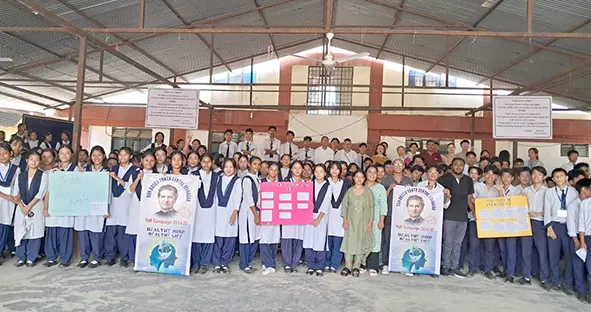ITANAGAR, 10 Sep: The Don Bosco Youth Centre (DBYC) for Young at Risk Services (YaRS) conducted an awareness programme on mental health, suicide prevention, and life skills on the occasion of the World Suicide Prevention Day at the Government Higher Secondary School in Ganga here on Tuesday.
The programme focused on identifying mental health challenges, developing coping mechanisms, and encouraging help-seeking behaviour.
DBYC YaRS coordinator Bipin Kujur emphasised the importance of empowering youths with knowledge and skills for mental wellbeing.
GHSS Principal Sosa Lowang expressed appreciation for the initiative and said, “This programme greatly complements our ongoing efforts to support the mental health of our students.”
The event concluded with a pledge ceremony, where participants committed to stand together against suicide and foster a safe and supportive environment.
The DBYC plans to continue organising similar programmes to promote mental health in schools and communities.
Six students from Rajiv Gandhi University interning at the DBYC played a significant role in the programme. Dora Yayun and Ranjdeep Namasudra delivered presentations on recognising suicidal tendencies and effective prevention strategies.
Over 700 students and teachers participated in the event, which also featured interactive sessions led by the DBYC team.
In East Siang district, the Arunachal Pradesh University (APU) in Pasighat observed the day by organising a series of events.
The day featured a skit performed by the first and third semester MA in social work students.
The skit, themed ‘Mental health: Stigma and awareness’, addressed the critical need for social support, timely intervention, and professional help in tackling mental health issues.
Psychiatrist Dr Magong Pangkam presented a session on ‘Depression and suicide’.
“Depression is a major factor leading to suicide, often described as more intense than the pain of childbirth,” Pangkam said, and provided details of the signs and symptoms of depression, the disorders that can contribute to it, and the cognitive patterns of worthlessness, helplessness, and hopelessness that frequently lead to suicidal thoughts.
Clinical psychologist Kenyam Pertin focused on the importance of mental health and self-care.
She explained how myths and stigma surrounding mental health issues can prevent individuals from seeking early intervention and hinder caregivers from recognising early warning signs.
Pertin called for “a shift in the narrative,” advocating normalisation of mental health discussions and breaking down societal taboos. She encouraged the participants to be attentive to their mental and physical needs, emphasising that “it is acceptable not to always be positive but important to maintain rational thoughts.”
DMO Dr Komling Perme highlighted the statistics governing suicide in India and the world and shared how advent of technology has resulted in comparative reduction in farmers’ suicide in India.
He also highlighted the availability of professional help and encouraged seeking support rather than resorting to copycat suicides.
District mental unit programme coordinator Dr Kato Lego spoke about the role of the International Association for Suicide Prevention in global efforts to reduce suicide rates, and emphasised the importance of World Suicide Prevention Day in raising awareness.
Assistant Professor Menuka Kadu pointed out that mental health issues often do not receive the same level of empathy and response as other medical conditions. She urged the participants to reconsider their attitude towards individuals suffering from mental health issues.
Referencing recent research, she noted that while road accidents are the leading cause of death among students worldwide, suicide is the leading cause in India, signifying a pressing issue and a need for instituting peer counsellors across educational institutions.
APU Registrar Narmi Darang highlighted the challenges faced by individuals struggling with mental health issues, including the difficulty in discussing their struggles and the lack of societal awareness regarding the signs of mental health conditions and suicidal tendencies.
The programme was organised by the APU’s social work department in collaboration with the East Siang district mental health unit. (With DIPRO input)




